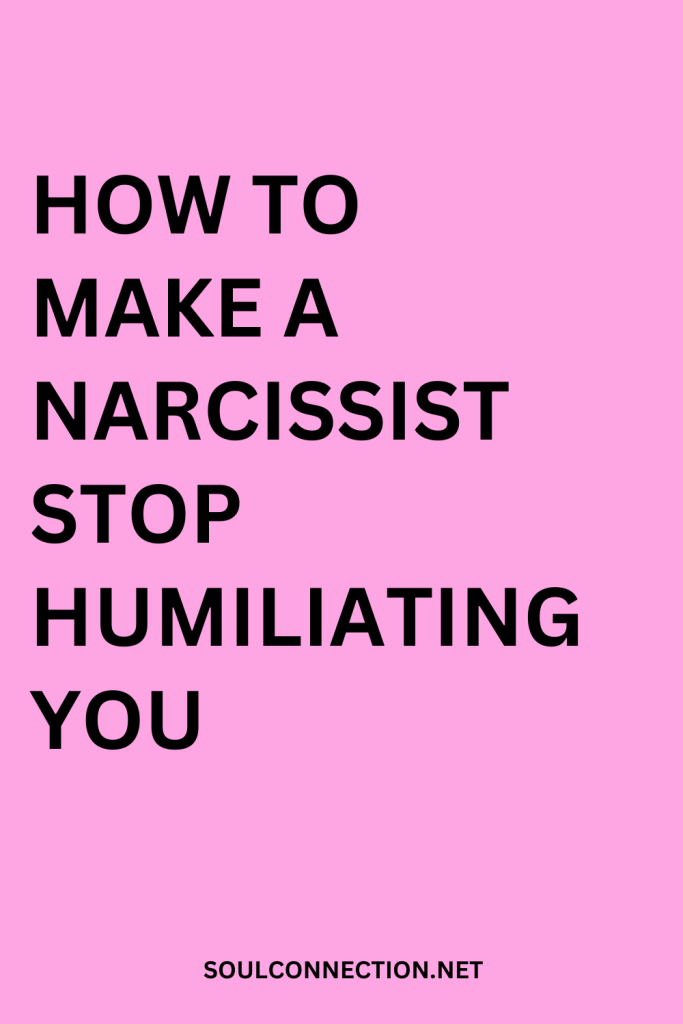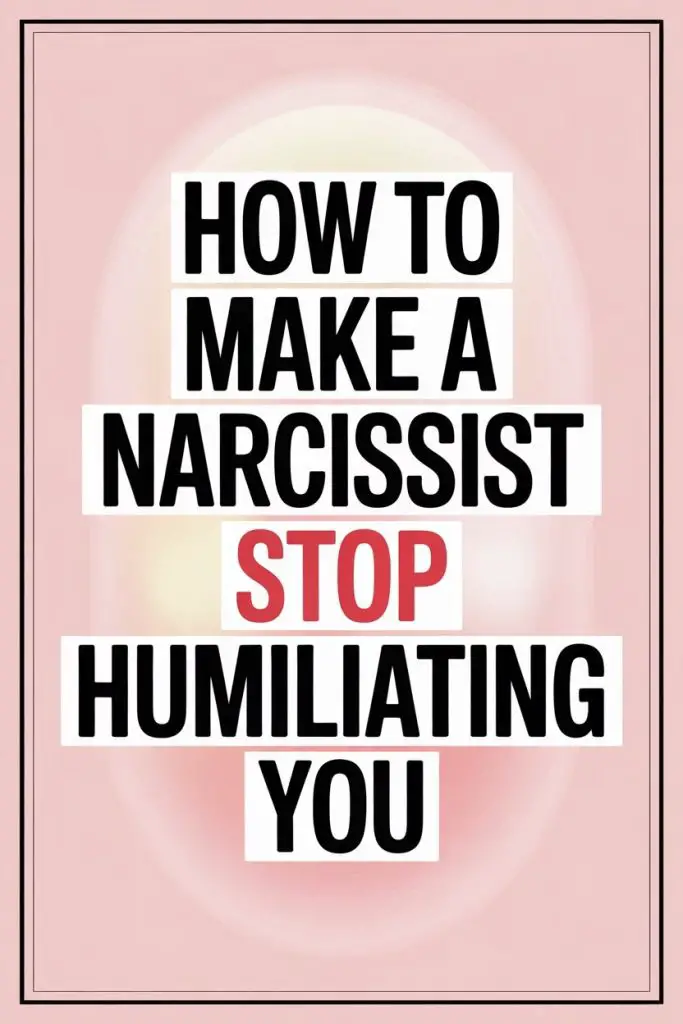Take a deep breath and check for hidden cameras—because living with a narcissist can feel like starring in a never-ending reality show, minus the paycheck.
If their favorite party trick is making you the punchline, you’re not alone (and you’re certainly not losing your mind). Let’s dig into what you can do when you’re tired of being the butt of someone else’s emotional slapstick.
Spotting the Humiliation Game
Imagine this: You’re at a family gathering, and your partner weaves a charming little tale about your kitchen mishaps—again. Cue the laughter. Sound familiar?
Narcissists rarely miss a chance to turn an ordinary moment into a power play. This can be sly—a snide remark, a backhanded compliment, or an “innocent” story with a sprinkle of public shaming.
Why the theatrics? Well, control and attention are like oxygen for narcissists. Humiliating you boosts their ego and shifts the spotlight right where they want it.
Recognizing you’re not “too sensitive”—you’re just being played—is the crucial first step in reclaiming your dignity.
Drawing the Line (Boldly, Please)
Boundaries. They’re not just for toddlers and garden fences. When a narcissist delights in putting you down, it’s time to erect a metaphorical wall, preferably one with barbed wire and a moat.
The trick is making your boundaries visible, firm, and—here’s the kicker—consistent.
Try something like, “I don’t appreciate being spoken about like that. Knock it off.” No need for an essay, just direct and calm. The narcissist may roll their eyes, mock you, or even double down. (Gold star for predictability.) Stick with it.
Each time you repeat your boundary, you chip away at their power to humiliate you.
The Power of “Grey Rock”
If you haven’t heard of this little strategy, allow me to introduce you to your new best friend: the “grey rock.” The idea is as glamorous as it sounds.
When the narcissist tries to bait you—either in public or in private—you give them as little emotional reaction as possible. Think of yourself as the world’s most boring pebble.
Short, noncommittal answers. No visible anger, tears, or desperate attempts to explain. The goal? Make yourself such a dull target that even a narcissist would rather find a new hobby.
It’s not about winning the argument; it’s about stepping out of the bullseye.
Don’t Feed the Troll
Responding to humiliation with outrage, tearful explanations, or a heated debate is like handing a narcissist a double espresso and the keys to your emotional Ferrari. Drama is their favorite sport.
If you sense a humiliation attempt heating up, keep your cool. If needed, excuse yourself from the room or change the subject.
Think of it as refusing to play a rigged game. No drama, no victory lap for them.
Reframe the “Jokes” (Even When They Don’t)
Nothing says “power move” quite like calling out a narcissist’s “just kidding” routine. When their version of playful banter leaves you bleeding, toss the ball back in their court—gently but assertively.
Try: “I actually don’t find that funny. Please stop.” Or, if you’re feeling spicy, “If that’s your idea of a joke, I’ll stick to my own sense of humor, thanks.” Not every narcissist will back down, but you’ve made it clear you’re not an easy target.
Collect Your Tribe
Humiliation thrives in isolation. One-on-one, a narcissist can spin reality, rewrite the past, and leave you questioning your own memory.
Gathering a support network (friends, family, or even a therapist who’s fluent in narcissist-ese) isn’t just about commiserating over bad wine.
These are the people who can validate your experience, remind you who you are, and occasionally tell you when spinach is in your teeth—without making it a viral story.
If it’s safe, confide in someone about what’s been happening. Not only does it lighten your load, but it may also curb the narcissist’s urge to perform when they realize you aren’t alone.
Master the Exit Strategy
In a perfect world, calling out humiliating behavior would trigger a heartfelt apology and maybe a home-cooked meal. In reality, a narcissist will often escalate their tactics when their go-to tricks stop working.
That’s when you may need to walk out—of the room, the event, or eventually the relationship—if humiliation crosses into emotional abuse.
Sometimes the best way to stop being humiliated is to remove yourself from the arena entirely.
If walking away isn’t possible every time, create buffers: agree on safe topics in public, set time limits for visits, or use the classic “I need to take this call” excuse. Channel your inner secret agent, minus the high-speed car chase.
Keep Your Self-Esteem on Life Support
Humiliation is designed to eat away at your confidence, cell by cell, until you start to believe you deserve this treatment. Call it what it is: nonsense.
Finding small ways to rebuild your self-worth—spending time with people who value you, picking up a hobby, even repeating corny affirmations in the mirror—can be revolutionary.
Give yourself credit for surviving and resisting the narcissist’s attempts to shrink you. You’re tougher than you think, even if you occasionally fantasize about throwing a pie in their face.
Spotting When It’s Gaslighting, Not Just a “Joke”
Many narcissists hide their humiliation behind, “I was just teasing,” or, “You’re too sensitive.” When they start rewriting your reactions or blaming you for being hurt, that’s not just a bad sense of humor—it’s gaslighting.
Remind yourself (and, if needed, your support people) that your feelings are real. When you sense this pattern, keep a little record.
No, you don’t need a spreadsheet, but jotting down what happened, when, and how you felt can help you recognize the cycle—and, crucially, prove to yourself that you’re not imagining things.
Therapy Isn’t Just for “Crazy” People
No shame in looking for backup. A good therapist can help you untangle the knots, whether you want to fix the relationship or just stop feeling like a human dartboard.
Therapy offers practical coping strategies and, perhaps more importantly, someone who gets it.
Counseling can also help you see the bigger picture: Are these humiliations ramping up? Are you safe? Are you ready to start planning your own grand escape?
Sometimes, having a professional in your corner is the boost you need to reclaim your power.
When Narcissist Meets Consequence
Nothing inspires a narcissist quite like getting away with it—again. If humiliation is part of their regular routine, consequences are overdue. This doesn’t mean plotting revenge (as fun as it sounds).
Real consequences look more like: “If you do this again, I’ll leave the table,” or “If you put me down in front of my friends, I’ll leave the gathering.”
Consistency is everything. Say what you mean, mean what you say, and follow through. If you’re met with a temper tantrum or a guilt trip, congratulations—you’ve pressed the right button.
You Deserve Respect, Not a Punchline
Surviving a relationship with a narcissist can feel like trying to win a staring contest with a brick wall. Their humiliation tactics are predictable, exhausting, and—here’s the good news—beatable.
Setting boundaries, refusing to rise to their bait, and building up your own support crew are the building blocks of self-preservation.
At the end of the day, respect isn’t too much to ask for, no matter how many times you’ve been told you’re “too sensitive.”
Your dignity is worth protecting, even if you have to bring your own moat and imaginary drawbridge to the party.
Now, go forth and be gloriously un-humiliated.
If the narcissist in your life doesn’t like it, well—there’s always improv comedy classes.


